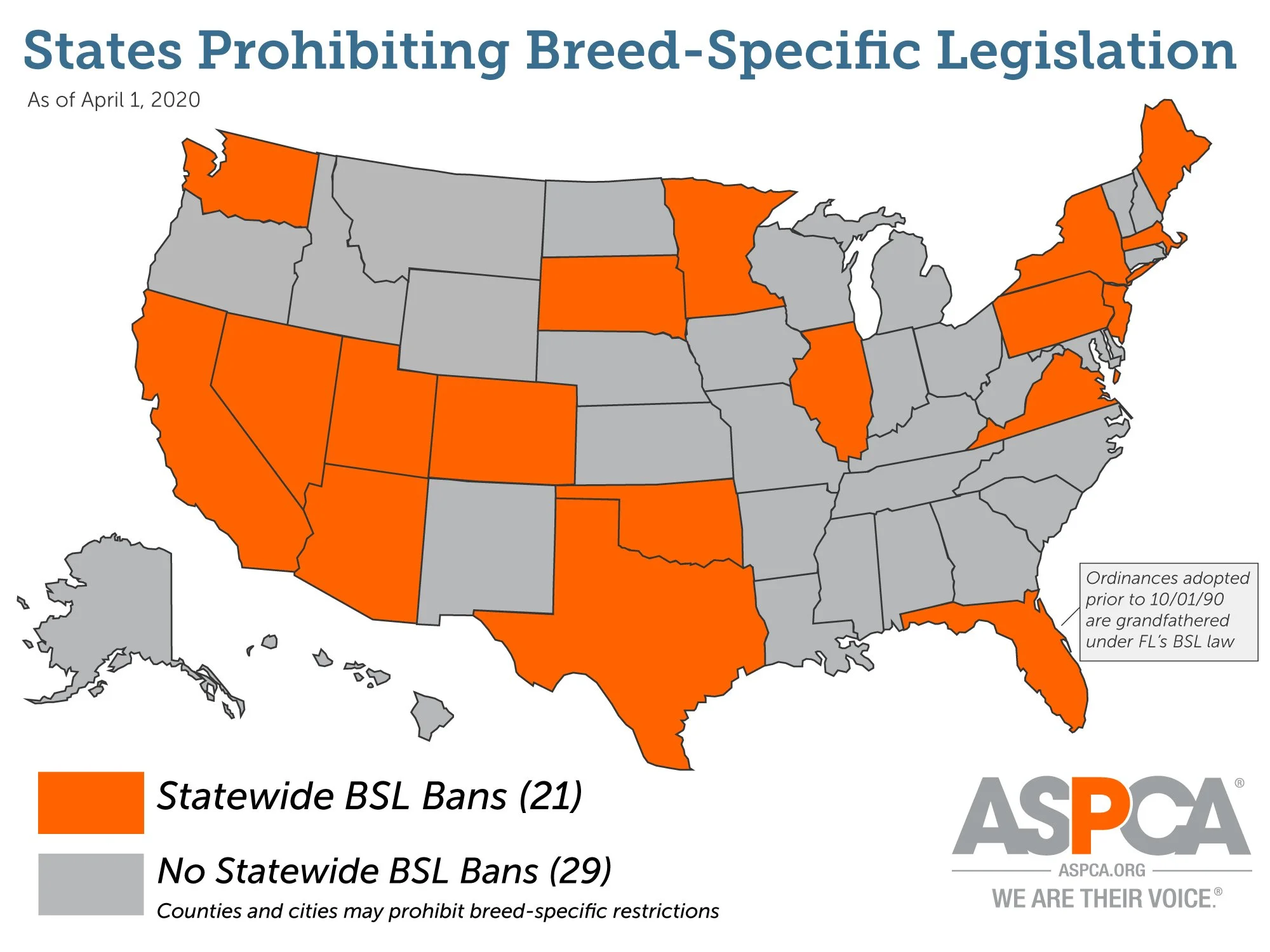The Controversy of Breed-Specific Legislation:Taking a Closer Look at Bully Breeds
Breed-specific legislation (BSL) in the United States has long been a contentious issue, particularly when it comes to breeds like Pit Bulls, American Bulldogs, and Staffordshire Bull Terriers, collectively known as bully breeds. While some jurisdictions have implemented regulations or even bans targeting specific breeds, it is important to approach this polarizing topic with an informed and objective mindset. Let’s explore the complexities of BSL with a specific focus on bully breeds, and examine the arguments both for and against this controversial legislation.
Understanding Breed-Specific Legislation
Breed-specific legislation refers to laws or regulations that target certain dog breeds, typically based on their perceived dangerousness. These laws can range from outright bans to requiring specific conditions, like muzzling or mandatory liability insurance, for owners of certain breeds. The intention behind such legislation is to reduce dog-related incidents or protect public safety.
Advocates of BSL argue that certain breeds, specifically bully breeds, have an inherently aggressive and dangerous temperament. They point to statistics that show a high incidence of dog-related incidents involving these breeds. Additionally, some proponents claim that BSL acts as a preventive measure, deterring potential dog owners from acquiring such breeds and reducing the likelihood of future incidents.
Several states in the United States have implemented some form of breed-specific legislation. There are also states, that as of January 2024, have legislation specifically against BSL:
Opponents of BSL criticize these laws for several reasons. First and foremost, they argue that the enforcement of BSL is problematic, as breed identification can be subjective and error-prone. Dogs with similar physical characteristics to banned breeds may be mistakenly targeted, causing undue harm to well-behaved animals. Furthermore, critics claim that BSL fails to address the root causes of dog aggression, such as irresponsible ownership or poor breeding practices.
Opponents of BSL argue that breed-specific legislation is an ineffective and unfair approach to addressing dog-related incidents. They argue that the behavior of a dog is determined by a range of factors, including its upbringing, training, and socialization. Moreover, opponents argue that focusing solely on breed ignores the fact that any dog, regardless of its breed, has the potential to be aggressive and dangerous.
Time and time again, bully breeds have proven they are no more inherently aggressive than other breeds. Would you consider Golden Retrievers and Border Collies to be inherently aggressive? No? Us neither. Sure, they can be, but most people don’t typically have that as their first thought. And according the American Temperament Testing Society (ATTS), they’ve objectively proven that bully breeds, specifically the American Pit Bull Terrier, pass the test more often than the aforementioned breeds.
Instead of BSL, opponents advocate for more comprehensive measures that address the root causes of dog-related incidents, such as promoting responsible pet ownership, increasing education and awareness about dog behavior, and enforcing laws that hold dog owners accountable for their pet's actions.
Bully Breeds and the Stereotype
Bully breeds have been unfairly stigmatized due to media sensationalism and misconceptions about their temperament. It is important to remember that breed does not determine a dog's behavior; individual factors, such as socialization, training, and environment, play a crucial role. Many advocates argue that breed-neutral laws that focus on responsible ownership, education, and enforcing existing dangerous dog statutes would be more effective in promoting public safety.
There is a growing movement to dispel the myths surrounding bully breeds and promote fair treatment and understanding of these dogs. While they have been historically associated with aggression and danger, this is simply not true. In fact, many bully breeds, such as pit bulls, are known for their loyalty, affectionate nature, and love of people.
Unfortunately, media outlets often sensationalize stories involving bully breeds, leading to further stigmatization and fear. This is unfair to the dogs themselves, as well as to responsible owners who provide a loving and safe home for their pets.
Alternatives to BSL
By focusing on responsible ownership and education, we can help ensure that all dogs, regardless of breed, are well-behaved and socialized. This includes providing proper training, exercise, and socialization opportunities, as well as ensuring that dogs are kept in safe and secure environments. With these measures in place, we can help promote public safety while also giving bully breeds the fair treatment and understanding they deserve.
Rather than targeting specific breeds, many experts propose a shift towards comprehensive and breed-neutral legislation. These laws focus on responsible pet ownership, better enforcement of existing laws, and community education programs. By addressing factors such as proper socialization, spaying/neutering, and owner accountability, these alternative approaches aim to promote a safer environment for both dogs and humans.
The issue of breed-specific legislation, particularly concerning bully breeds, remains highly debatable. While certain dog breeds may have historically been used for nefarious purposes, it is crucial to approach this topic with an objective mindset. Responsible ownership, appropriate training, and public education are key to fostering safer communities for all pets and humans alike. By focusing on these aspects, we can create a more informed and compassionate society that promotes the welfare and safety of all dog breeds.


